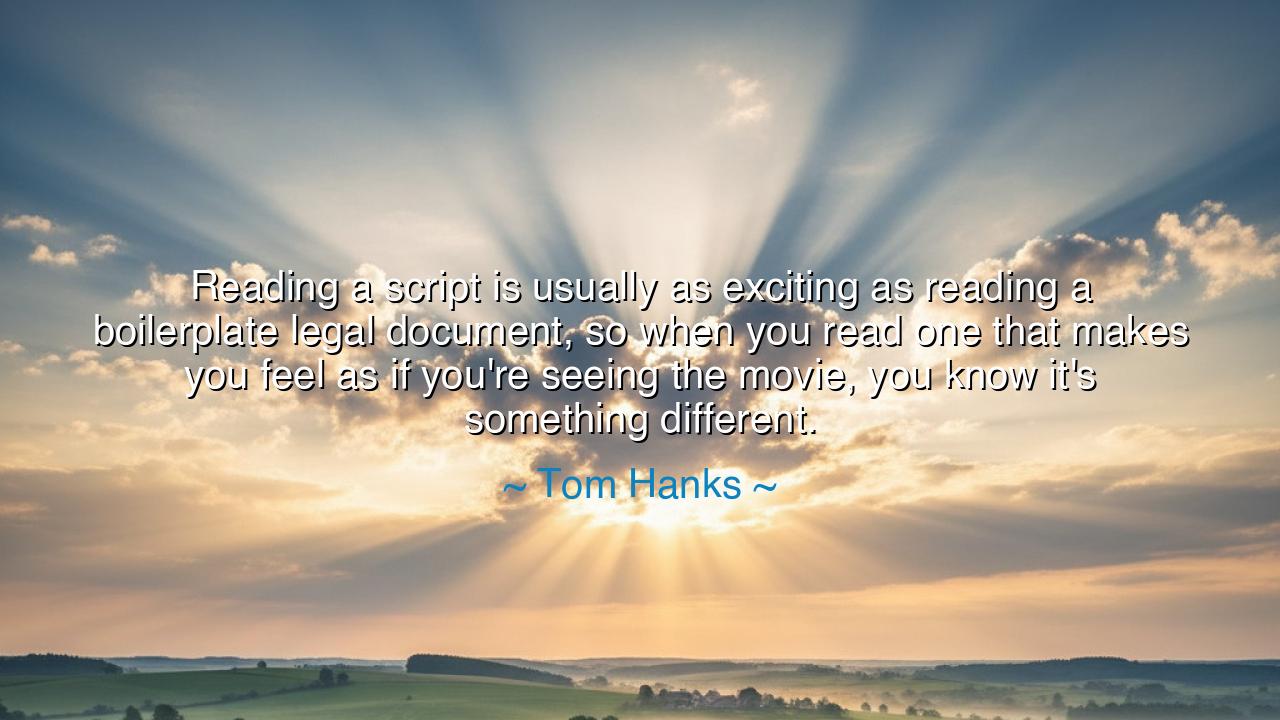
Reading a script is usually as exciting as reading a boilerplate
Reading a script is usually as exciting as reading a boilerplate legal document, so when you read one that makes you feel as if you're seeing the movie, you know it's something different.






In the words of Tom Hanks, we are given a reflection not just on the craft of cinema, but on the nature of art that stirs the soul: “Reading a script is usually as exciting as reading a boilerplate legal document, so when you read one that makes you feel as if you're seeing the movie, you know it's something different.” Beneath this modest jest lies a truth that transcends film and touches every realm of human creation — that imagination must breathe life into the lifeless, that words must leap from the page and become vision, feeling, and heartbeat. Hanks reminds us that the difference between mediocrity and magic is not in the ink or the structure, but in the spirit that animates them.
In ancient times, the storytellers of Greece and the bards of the East held this same belief. When Homer sang the Iliad, he was not reading from parchment — he was painting with sound, igniting battlefields and tears in the minds of his listeners. The written word was only a vessel; the fire came from within the human soul. In the same way, Tom Hanks, as a man of film, speaks of that rare script that transforms paper into vision, that awakens in the reader a sense that they are already watching something unfold before their eyes. Such writing is not mechanical. It is alive.
The “boilerplate legal document” he mentions is not only literal but symbolic. It stands for all that is soulless, repetitive, and safe — the work done by habit, not by heart. Many creators, whether in law, literature, or art, fall into the trap of precision without passion. They fulfill form, yet fail to move. But when the muse enters, when the imagination burns through the lines, suddenly the ordinary becomes divine. A true script, or any true creation, carries the pulse of its maker. It transcends the intellect and touches emotion.
Consider the story of Francis Ford Coppola as he crafted The Godfather. When he first read Mario Puzo’s novel, many thought it was a conventional gangster tale. Yet Coppola saw the film within the pages — he saw family, power, corruption, and the tragedy of inheritance. He brought it to life not as crime fiction, but as modern myth. Like Hanks described, Coppola experienced what few do: the rare moment when words become images, and images become destiny. This is the mark of greatness — to perceive the unseen film hidden within text, and to bring it forth.
The quote also reminds us that true artistry demands vision beyond the literal. To read merely for the words is to see the skeleton; to read for the vision is to glimpse the soul. Many people, in their work or in their relationships, approach life as though it were a legal document — fulfilling requirements, ticking boxes, avoiding error. But the masters of any craft — from painting to teaching, from law to leadership — are those who infuse their actions with imagination. They see the living picture where others see lines.
Hanks’s wisdom thus carries a broader teaching: that inspiration is rare, but recognizable. When something moves you deeply — a poem, a film, a melody, or even a conversation — do not dismiss it. That stirring of the spirit is the mark of truth. It means the work you behold is not merely crafted but breathed into being. Just as the ancients believed the gods whispered into the hearts of poets, so too does creativity whisper to us today, reminding us that real beauty transcends the mechanical and the mundane.
Let us then learn from this: to write, speak, build, or love in a way that awakens vision. Whether we craft a story or live a day, let it be so vivid that it feels as though one is watching it unfold in light. Avoid the lifeless forms of duty; seek instead the vibrant force of meaning. For the true artist, as Tom Hanks teaches, is not one who writes, but one who sees — and helps others see through him.
So, when next you read, or work, or dream, ask yourself: does it feel like life? Does it move as a movie moves, scene by scene, heart by heart? If it does, then you have found that rare and sacred thing — the spark of creation, which makes mere words become worlds.






AAdministratorAdministrator
Welcome, honored guests. Please leave a comment, we will respond soon